研究生英语高级教程 第6单元 At What Cost Beauty
研究生英语(人大版第三版)u6

PPaarrtt3 1(0P-a1r2a10-12)
• [10] we must accept our losses,and learn how to let go.
• 为了要解决这个矛盾,我们必须寻找一个较为广阔的视角 ,透过通向永恒的窗口来观看我们的生命。
• [15] Life is never just being.
• 生命绝不只是存在。
• The beauty we fashion cannot be dimmed by death.Our flesh may ,our hands will wither,but that which they create in beauty and goodness and truth lives on for all time to come.
when to hold fast and when to let go.
• 生活的秘诀在于懂得何时抓紧,何时放松。
Part 2 (para.2~9)
Main idea :
• [2]Surely we ought to hold fast to life, for it is wondrous,and full of a beauty that breaks through every pore of God's own earth.
• 我们创造的美好的东西不会因为我们的死亡而暗 淡无光。我们的肉体会消亡,我们的双手也会枯 萎,但它们在真善美中所创造的一切将在日后长 存!
• [16]Pursue not so much the material as the ideal,for ideals alone invest life with meaning and are of enduring worth.
(完整版)华中师大版《研究生英语读写译教程》上Unit1-Unit6TextA单词
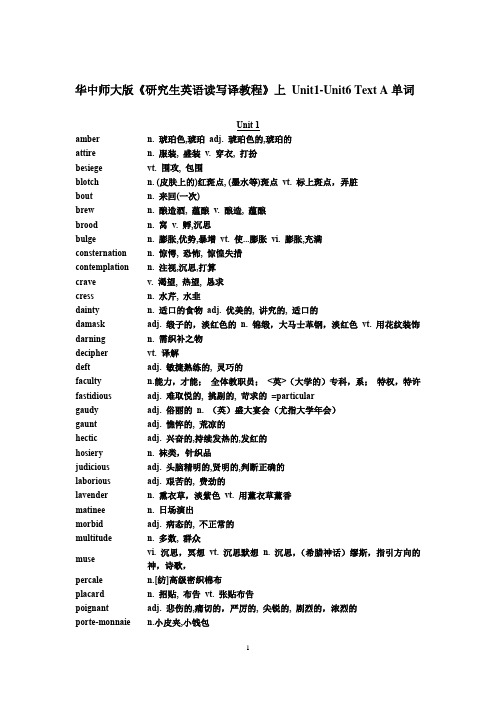
华中师大版《研究生英语读写译教程》上Unit1-Unit6 Text A单词Unit 1amber n. 琥珀色,琥珀adj. 琥珀色的,琥珀的attire n. 服装, 盛装v. 穿衣, 打扮besiege vt. 围攻, 包围blotch n. (皮肤上的)红斑点, (墨水等)斑点vt. 标上斑点,弄脏bout n. 来回(一次)brew n. 酿造酒, 蕴酿v. 酿造, 蕴酿brood n. 窝v. 孵,沉思bulge n. 膨胀,优势,暴增vt. 使...膨胀vi. 膨胀,充满consternation n. 惊愕, 恐怖, 惊惶失措contemplation n. 注视,沉思,打算crave v. 渴望, 热望, 恳求cress n. 水芹, 水韭dainty n. 适口的食物adj. 优美的, 讲究的, 适口的damask adj. 缎子的,淡红色的n. 锦缎,大马士革钢,淡红色vt. 用花纹装饰darning n. 需织补之物decipher vt. 译解deft adj. 敏捷熟练的, 灵巧的faculty n.能力,才能;全体教职员;<英>(大学的)专科,系;特权,特许fastidious adj. 难取悦的, 挑剔的, 苛求的=particulargaudy adj. 俗丽的n. (英)盛大宴会(尤指大学年会)gaunt adj. 憔悴的, 荒凉的hectic adj. 兴奋的,持续发热的,发红的hosiery n. 袜类,针织品judicious adj. 头脑精明的,贤明的,判断正确的laborious adj. 艰苦的, 费劲的lavender n. 熏衣草,淡紫色vt. 用薰衣草薰香matinee n. 日场演出morbid adj. 病态的, 不正常的multitude n. 多数, 群众muse vi. 沉思,冥想vt. 沉思默想n. 沉思,(希腊神话)缪斯,指引方向的神,诗歌,percale n.[纺]高级密织棉布placard n. 招贴, 布告vt. 张贴布告poignant adj. 悲伤的,痛切的,严厉的, 尖锐的, 剧烈的,浓烈的porte-monnaie n.小皮夹,小钱包preposterous adj. 荒谬的, 可笑的profusion n. 丰多, 大量,浪费reconcile vt. 和解,调和,妥协vi. 调和retired adj. 退休的,退役的retrospection n.<正式>回顾,追忆,考虑revel vi. 狂欢作乐, 陶醉n. 作乐, 狂欢sniffle v. 鼻子哼哼做声, 抽鼻涕, 哽咽n. 鼻子哼哼做声, 冷淡的对待soothing adj. 抚慰的;使人宽心的v. 安慰;减轻痛苦(soothe的现在分词)symmetrical adj. 对称的tiara n. 冠状头饰, (罗马教皇戴的)三重冠usher n. 带位员,招待员vt. 引导, 护送vi. 做招待,担任引座员veritable adj. 真实的, 确实的, 真正的wiggle v.扭动,摆动,踌躇n.扭动,蠕动,踌躇n.奶油青豆烧鱼wizard n. 男巫, 术士, 鬼才adj. 男巫的, 巫术的abandon n. 放纵vt. 放弃,遗弃,沉溺file out vi. 陆续退出by degrees渐渐地, 逐渐地indulge in沉溺于,纵情于make out vt. 起草,说明,结论,辨别,理解vi. 进展stick to坚持Unit 2adore v. 崇拜,爱慕,喜爱celebrity n. 名人, 著名,著名人士, 名声, 名誉, 社会名流combat n. 争斗,战斗vt. 打斗vi. 战斗,与…斗争adj. 战斗的converge vi. 聚合,集中于一点vt. 使集合distinction n. 区别; 卓越; 殊荣draft n. 草稿,草图,汇票,徵兵vt. 起草,征兵,选秀adj. 酝酿中的eligible adj. 可以选的,有资格的,合格的n. 有资格者,合格者,适任者emulate vt. 效法, 尽力赶上, 仿真[计算机] 仿真endorsement n. 支持,认可,背书excel vt. 超过, 优于vi. 胜出[计算机] 软件名称ferocious adj. 残忍的, 凶猛的,极度的,十分强烈的frustrate vt. 挫败,击败,破坏adj. 无益的,挫败的,挫折的icon n. 肖像, 偶像, 象征, 图符[计算机] 图标,图符lucrative adj. 有利益的,获利的,合算的profitable adj. 有益的, 有用的mogul n. 显要人物, 权势之人n. 小雪坡opponent n. 对手, 敌手, 反对者adj. 敌对的, 反对的pitch n.场地;最高点;音高;说教vt.用沥青涂;扔,投;树起,搭起;定位于vi.抛,扔;[棒球]当投手;搭帐篷;向前跌或冲profile n.侧面,半面;外形,轮廓;[航]翼型;人物简介vt.描…的轮廓;给…画侧面图;为(某人)写传略;[机]铣出…的轮廓rekindle v. 重新点燃revere v. 尊敬, 敬畏, 崇敬里维尔(美国马萨诸塞州城市, 避暑胜地) scrutiny n. 详细审查;监视;细看;选票复查stardom n. 演员的身份,演员们statue n. 塑像,雕像status n. 地位, 身份, 情形, 状况stature n. 身材, 身高transcend v. 超越trim n. 整齐,装饰,修剪下来的部分adj. 整洁的,匀称的adv. 整齐地vt. 修除,削剪,装备,痛打,击败, 使整洁vi. 保持平衡, 见风使舵abide by v. 遵守, 服从be eligible for适合于..., 对... 合格fall apart崩溃,瓦解, 破裂, 破碎shine through(喻)表现出来starve for v.急需,渴望take over接管,接任n. 接收,接管Transform… into…把……变成……Unit 3accumulate vt. 积聚,累加,堆积vi. 累积awaken v. 唤醒, 醒来, 唤起colloquial adj. 白话的,口语的,语体的conquest n. 征服contact lens n. 隐形眼镜comic n. 连环图画,喜剧演员,喜剧元素adj. 滑稽的,有趣的,喜剧的commoner n. 平民, 自费学生, 有共用权的人corrupt adj. 腐败的,堕落的vt. 使...恶化,贿赂,使...腐烂vi. 腐烂,堕落defiant adj. 挑衅的, 目中无人diminish vt. 减少,变小, 减损vi. 变少, 逐渐变细dominant adj. 占优势的,主导的,显性的n. 主宰者egghead n. 知识分子,理论家enlargement n. 扩大, 扩建,放大的照片erroneous adj. 错误的, 不正确的expansion n. 扩大,膨胀,扩充exuberance n. 茂盛, 充沛, 丰富Germanic adj. 德国的, 条顿民族的, 条顿语的n. 日耳曼语inclined adj. 倾向于...的infinitive n. 不定式adj. 不定式的ingratiate vt. 逢迎, 讨好inhabitant n. 居民institute n. 学会,学院,协会vt. 创立,开始,制定layman n. 俗人(对僧侣而言), 门外汉microfilm n. 缩影胶片mobility n. 可动性, 变动性, 情感不定Norman n.法国诺曼第人adj.诺曼第的,诺曼第人[语]的Norseman n. 古代挪威人, 古代斯堪地那维亚人parking meter汽车停放计时器, 汽车停放收费器raid n. 袭击;突袭;搜捕;抢劫vi. 对…进行突然袭击vt. 袭击,突袭n. (Raid)人名;(阿拉伯)拉伊德riot v.&n. 骚乱,闹事vi. 闹事,骚乱smog n. 烟雾stabilization n.稳定性sturdy adj. 强健的, 健全的surly adj. 不和蔼的, 板著面孔的, 粗声暴气的uneven adj. 不平坦的, 不均匀的, 奇数的variant n. 变体adj. 不同的villain n. 坏人, 恶棍be bound to conj. 必然(不得不,束缚于,必须)reduce to降至,把...简化为Unit 4 abductor n. 诱拐者, [解]外展肌allegation n. 断言,主张,辩解,暗指amnesia n. 健忘症,记忆缺失auditorium n. 礼堂,观众席bashful adj. 害羞的celibacy n. 独身(主义),禁欲charlatan n. 冒充内行者,骗子cynical adj. 愤世嫉俗的,吹毛求疵的demolish v. 毁, 破坏, 粉碎deplorable adj. 可叹的, 悲惨的, 凄惨的dictator n. 独裁者dispatch n. 派遣;急件vt. 派遣;分派distill v. 蒸馏, 滴下,吸取,提炼edifice n. 大厦, 大建筑物exalt v. 赞扬, 提升,加强fable n. 寓言fiduciary adj. 受托的, 信托的gullible adj. 易受骗的,轻信的halo n. (日月等)晕, 神像之光环harrowing adj. 悲痛的, 难受的动词harrow的现在分词形式homoerotic adj.同性恋(爱)的infidelity n. 不信神, 无信仰, 背信intractable adj. 不听话的, 倔强的, 棘手的irreparable adj. 不能修补的, 不能挽回的laureate n. 桂冠诗人,得奖人adj. 杰出的,带桂冠的vt. 戴桂冠,授予荣誉,授予桂冠诗人的称号mafia n. 黑手党, 秘密政党marital adj. 婚姻的monochromatic adj. 单色的,一色的namaste n.(印度)合十礼pedestal n. 基架, 底座, 受人尊敬的地位vt. 加座, 搁在台上plagiarize vt. 抄袭(剽窃,借用)presumably adv. 推测上,假定上,大概rack n. (行李)架,拷问台,齿轨vt. 折磨,使痛苦,拷问vi. 顶风飞行recrimination n. 反控告, 反责discrimination n. 歧视, 辨别力, 识别secular n. 牧师,凡人adj. 世俗的,现世的,不朽的shatter n. 碎片,乱七八糟的状态vt. 打碎,破掉,散开vi. 打破,脱落skeptical adj. 怀疑的smarmy adj. 令人厌烦的, 爱说奉承话的sooth adj. 真实的柔软的,甜蜜的;抚慰的stumble n. 绊倒,失策vi. 绊倒,失策,踌躇,无意中发现vt. 绊倒,困惑swashbuckling adj. 恃强凌弱的,虚张声势的动词swashbuckle的现在分词形式warp n. 弯,歪曲,乖僻vt. 弄歪,翘曲akin to vt. 类似(近于, 的同族)go astray迷路,误入歧途seize upon抓住,利用subscribe to订阅, 同意, 支持, 捐赠Unit 5advertising n. 广告业,广告adj. 广告的ambiguity n. 不明确,含糊,暧昧,模棱两可approximately adv.近似地,大约ascribe v. 归因于, 归咎于billboard n. 布告板,揭示栏,广告牌brash adj. 性急的, 仓促的, 无礼的n. 胃灼热, 骤雨, 碎片coincide v. 与...一致,符合,暗合commercial adj. 商业的n. 商业广告contingent adj. 或许会或不会发生的,附随的,暂时的n. 偶然的事情,份儿,分遣队disrupt adj. 分裂的,分散的v. 使...分裂,使...瓦解document n. 文件,公文vt. 记载,用文件等证明[计算机] 文档elevated adj. 抬高的,高尚的,升高的动词elevate的过去式和过去分词ethos n. 民族精神,道德风貌,思潮信仰feature n. 特征, 容貌vt. 以...为特色vi. 起重要作用gradient n. 倾斜度,坡度,升降率adj. 倾斜的,步行的,步行态的identical adj. 相同的,同一的intimidate vt. 威胁,恐吓,胁迫savvy v.知道,了解n.机智;头脑;理解;悟性adj.有见识的,懂实际知识的,通情达理的mill n. 磨粉机, 磨坊, 制造厂, 密尔:一种货币单位, 使陷于困境vt. 磨细vi. 乱转, 磨细overt adj. 公开的, 明显的, 公然的pedestrian adj. 徒步的,缺乏想像的n. 行人prominent adj. 杰出的,显著的,突出的pun n. 双关语vt. 说双关语respondent n.回答者;[法](特指离婚诉讼的)被告;[生]反应,反射adj.应答的;有反应的;[法]被告的critique n. 批评,批评法,评论effacement n.抹消,抹杀self-effacement n. 不出风头, 谦逊status quo n. 现状strand n.(绳子的)股,绞;海滨,河岸;(思想等的)一个组成部分vt.使滞留,使搁浅;使陷于困境vi.搁浅;陷入困境surpass vt. 超越,凌驾,胜过sway n. 摇摆,动摇,影响力,支配vt. 使摇摆,使动摇,影响或控制vi. 摇摆,支配,动摇swoosh v. 发出嗖的一声,喷涌,旋动n. 嗖的一声synonymous adj. 同义的tactics n.战术,策略thought-provoking adj. 令人深思的, 发人深省的via prep. 经由account for对……负有责任;对……做出解释;说明……的原因;导致;(比例)占coincide with符合,与... 一致cutting edge尖端,前沿(刀片的)刃口,剪刃,切削刃drift n. 漂移,漂流物,观望,漂流,吹积物,趋势vi. 漂移,漂流,吹积vt. 使漂流,把...吹积in the case of adj. 万一(就...来说,至于)mount on登上play down降低,贬低, 减弱,淡化reflect on考虑,反思Unit 6 adversary n. 敌手, 对手alliance n. 结盟,联盟,联姻Alliance [地理名词] ally n. 盟友,同盟国vt. &vi. 联盟,联合,同盟anew adv. 重新, 再assembly n. 集合, 集会, 装配asunder adj. 分开地,零散地adv. 分离,化为碎片beachhead n.滩头阵地,立足点bear n. 熊v. 忍受,负荷v. 结果实,生子女belabor vt. 痛击,痛斥,冗长地解释bond n. 债券;结合;约定;粘合剂vi. 结合,团结在一起vt. 使结合;以…作保civility n. 礼貌, 端庄commit v. 委托(托付), 犯罪, 作...事, 承诺[计算机] 委托convert v. 使转变, 使...改变信仰, 倒置n. 皈依者, 改宗者conscience n. 良心, 责任心, 顾忌embattled adj. 被敌人围困的,严阵以待的动词embattle的过去式和过去分词形式endeavor n. 努力, 尽力, 进取心vt. 努力,尽力vi. 企图, 谋求engulf v. 吞没eradicate v. 根除, 扑减, 根绝foe n. 敌人,仇敌,反对物,有害物forebear n. 祖先, 祖宗=forbearforge n. 熔炉, 铁工厂vt. 锻造, 想出, 伪造, 构建vi. 稳步(高速)前进, 制假formulate vt. 规划;用公式表示;明确地表达forum n. 论坛, 讨论会heir n. 继承人hemisphere n. 半球heritage n. 遗产, 继承物humanity n. 人类人性;人道;慈爱inaugural adj. 就职典礼的,创始的n. 就职演说,就职典礼invective n. 恶言漫骂,臭骂adj. 漫骂的,非难的,恶言的invoke vt. 求助,用咒语召唤,请求,应用,引起[计算机] 调用misery n. 痛苦,悲惨的境遇,苦难oath n. 誓言,誓约,咒骂语odds n. 让步,机率,可能性,比率,胜败优劣之别outpace vt. 超过... 速度, 赶过pledge n. 保证,誓言,抵押,抵押品vt. 保证,誓言,举杯祝...健康prey n. 被掠食者,牺牲者vi. 捕食,掠夺,使...苦恼renewal n. 更新, 革新, 复兴, 复活shield n. 盾,防卫物,盾状物vt. 保护,遮蔽shrink n. 收缩,萎缩vi. 收缩,退缩,萎缩vt. 使收缩signify v. 象徵, 预示sincerity n. 诚实, 真实, 诚心诚意split n. 劈开, 裂片, 裂口adj. 分散的v. 分离, 分开, 劈开sovereign n. 元首,金镑adj. 具有主权的,至高无上的,极好的,完全的stay n. 停留,停止;依靠,忍耐力;撑条vt. 等待,坚持到底vi. 保持,停留,留宿subversion n. 颠覆, 破坏summon vt. 召唤,召集,振奋swear n. 发誓, 誓言vt. &vi. 发誓, 宣誓, 咒骂temper n. 脾气;(钢等)回火;性情;倾向vt. 使回火;锻炼;调和;使缓和vi. 回火;调和testimony n. 证言,证据tribulation n. 苦难, 灾难twilight n. 黄昏,微光,略知v. 使微明tyranny n. 暴政,苛政,专制undo v. 解开,松开,取消unleash v. 解开...的皮带, 解除...的束缚, 解放writ n. 令状,文书,文件a host of大量,许多, 一大群ask of要求,期望at issue在争论(在争论中)at odds争吵,不和, 不一致commit to把... 托付给, 把... 置于end up结束,告终year in and yearout一年一年地, 年复一年。
研究生英语阅读教程(提高级) Lesson 6
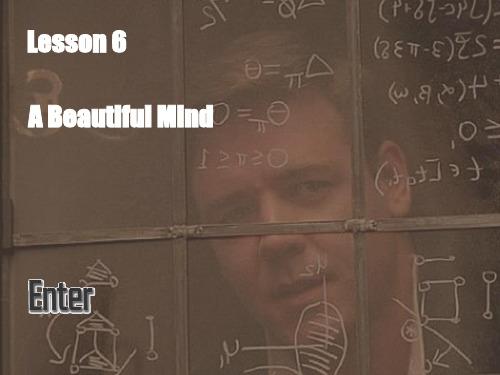
Language Points
1. strain (v.) to stretch sth tightly by pulling; to make the greatest possible effort; to injure or weaken a part of your body by stretching too much or trying too hard; to force sth beyond a limit of what is acceptable (Para. 1) 那条绳子快要被拉断了。 ① 那条绳子快要被拉断了。 The rope was strained almost to the breaking point. 那位歌手声嘶力竭才把高音唱出来。 ② 那位歌手声嘶力竭才把高音唱出来。 The singer had to strain to reach the high notes. 你在这样的光线下看书会伤害眼睛的。 ③ 你在这样的光线下看书会伤害眼睛的。 You’ll strain your eyes trying to read in this light. 难民的涌入使我们有限的设施不堪重负。 ④ 难民的涌入使我们有限的设施不堪重负。 The influx of refugees is straining our limited facilities.
Language Points
4. be jealous of formal wanting to keep or protect something that you have because you are proud of it 小心守护,珍惜,惟 小心守护,珍惜, 恐失去 他们尽力维护自己的权利。 ① 他们尽力维护自己的权利。 They are jealous of their rights. 这里的人们很珍惜他们的自由。 ② 这里的人们很珍惜他们的自由。 The people here are jealous of their freedom. 她极度害怕失去她的男朋友。 ③ 她极度害怕失去她的男朋友。 She was extremely jealous of her boy-friend.
《研究生英语精读教程》(第三版下)Unit 6课文
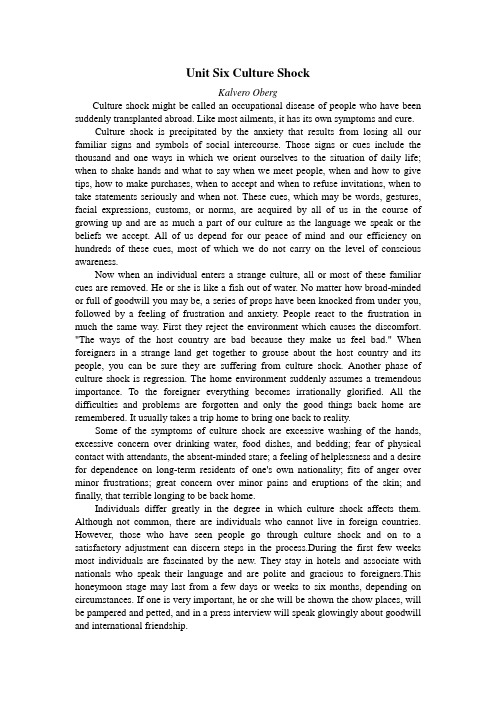
Unit Six Culture ShockKalvero ObergCulture shock might be called an occupational disease of people who have been suddenly transplanted abroad. Like most ailments, it has its own symptoms and cure.Culture shock is precipitated by the anxiety that results from losing all our familiar signs and symbols of social intercourse. Those signs or cues include the thousand and one ways in which we orient ourselves to the situation of daily life; when to shake hands and what to say when we meet people, when and how to give tips, how to make purchases, when to accept and when to refuse invitations, when to take statements seriously and when not. These cues, which may be words, gestures, facial expressions, customs, or norms, are acquired by all of us in the course of growing up and are as much a part of our culture as the language we speak or the beliefs we accept. All of us depend for our peace of mind and our efficiency on hundreds of these cues, most of which we do not carry on the level of conscious awareness.Now when an individual enters a strange culture, all or most of these familiar cues are removed. He or she is like a fish out of water. No matter how broad-minded or full of goodwill you may be, a series of props have been knocked from under you, followed by a feeling of frustration and anxiety. People react to the frustration in much the same way. First they reject the environment which causes the discomfort. "The ways of the host country are bad because they make us feel bad." When foreigners in a strange land get together to grouse about the host country and its people, you can be sure they are suffering from culture shock. Another phase of culture shock is regression. The home environment suddenly assumes a tremendous importance. To the foreigner everything becomes irrationally glorified. All the difficulties and problems are forgotten and only the good things back home are remembered. It usually takes a trip home to bring one back to reality.Some of the symptoms of culture shock are excessive washing of the hands, excessive concern over drinking water, food dishes, and bedding; fear of physical contact with attendants, the absent-minded stare; a feeling of helplessness and a desire for dependence on long-term residents of one's own nationality; fits of anger over minor frustrations; great concern over minor pains and eruptions of the skin; and finally, that terrible longing to be back home.Individuals differ greatly in the degree in which culture shock affects them. Although not common, there are individuals who cannot live in foreign countries. However, those who have seen people go through culture shock and on to a satisfactory adjustment can discern steps in the process.During the first few weeks most individuals are fascinated by the new. They stay in hotels and associate with nationals who speak their language and are polite and gracious to foreigners.This honeymoon stage may last from a few days or weeks to six months, depending on circumstances. If one is very important, he or she will be shown the show places, will be pampered and petted, and in a press interview will speak glowingly about goodwill and international friendship.But this mentality does not normally last if the foreign visitor remains abroad and has seriously to cope with real conditions of life. It is then that the second stage begins, characterized by a hostile and aggressive attitude toward the host country. This hostility evidently grows out of the genuine difficulty which the visitor experiences in the process of adjustment. There are house troubles, transportation troubles, shopping troubles, and the fact that people in the host country are largely indifferent to all these troubles. They help, but they don't understand your great concern over these difficulties. Therefore, they must be insensitive and unsympathetic to you and your worries. The result, “I just don't like them.” You become aggressive, you band together with others from your country and criticize the host country, its ways, and its people. But this criticism is not an objective appraisal. Instead of trying to account for the conditions and the historical circumstances which have created them, you talk as if the difficulties you experience are more or less created by the people of the host country for your special discomfort.You take refuge in the colony of others from your country which often becomes the fountainhead of emotionally charged labels known as stereotypes. This is a peculiar kind of offensive shorthand which caricatures the host country and its people in a negative manner. The "dollar grasping American" and the "indolent Latin Americans“are samples of mild forms of stereotypes. The second stage of culture shock is in a sense a crisis in the disease. If you come out of it, you stay; if not, you leave before you reach the stage of a nervous breakdown.If visitors succeed in getting some knowledge of the language and begin to get around by themselves, they are beginning to open the way into the new cultural environment. Visitors still have difficulties but they take a "this is my problem and I have to bear it" attitude. Usually in this stage visitors take a superior attitude to people of the host country. Their sense of humor begins to exert itself. Instead of criticizing, they joke about the people and even crack jokes about their own difficulties. They are now on the way to recovery.In the fourth stage, your adjustment is about as complete as it can be. The visitor now accepts the customs of the country as just another way of living. You operate within the new surroundings without a feeling of anxiety, although there are moments of social strain. Only with a complete grasp of all the cues of social intercourse will this strain disappear. For a long time the individual will understand what the national is saying but is not always sure what the national means. With a complete adjustment you not only accept the food, drinks, habits, and customs, but actually begin to enjoy them. When you go home on leave, you may even take things back with you; and if you leave for good, you generally miss the country and the people to whom you became accustomed.。
研究生英语精读教程(第三版_上)第6单元英文原文及翻译和课后答案
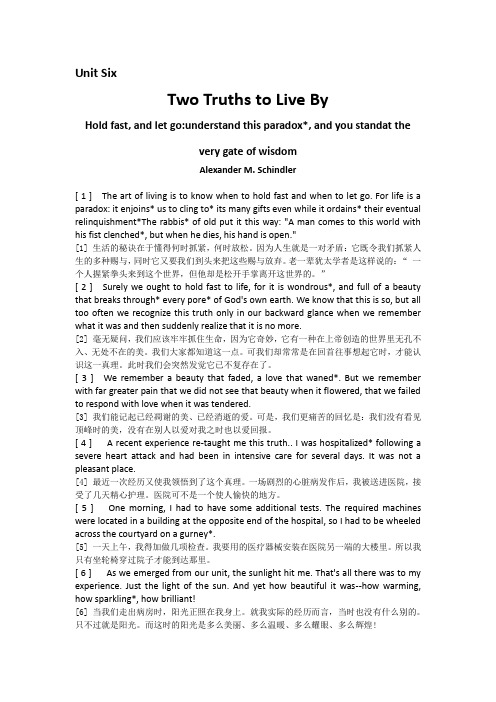
Unit SixTwo Truths to Live ByHold fast, and let go:understand this paradox*, and you standat thevery gate of wisdomAlexander M. Schindler[ 1 ] The art of living is to know when to hold fast and when to let go. For life is a paradox: it enjoins* us to cling to* its many gifts even while it ordains* their eventual relinquishment*The rabbis* of old put it this way: "A man comes to this world with his fist clenched*, but when he dies, his hand is open."[1] 生活的秘诀在于懂得何时抓紧,何时放松。
因为人生就是一对矛盾:它既令我们抓紧人生的多种赐与,同时它又要我们到头来把这些赐与放弃。
老一辈犹太学者是这样说的:“ 一个人握紧拳头来到这个世界,但他却是松开手掌离开这世界的。
”[ 2 ] Surely we ought to hold fast to life, for it is wondrous*, and full of a beauty that breaks through* every pore* of God's own earth. We know that this is so, but all too often we recognize this truth only in our backward glance when we remember what it was and then suddenly realize that it is no more.[2] 毫无疑问,我们应该牢牢抓住生命,因为它奇妙,它有一种在上帝创造的世界里无孔不入、无处不在的美。
研究生英语高级教程 第6单元 At What Cost Beauty
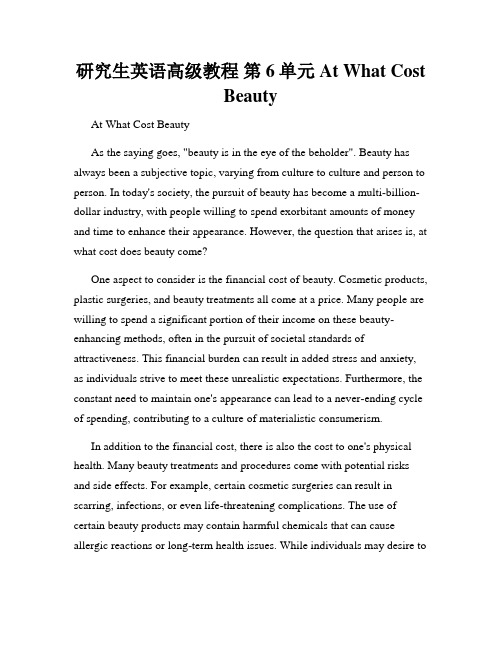
研究生英语高级教程第6单元 At What CostBeautyAt What Cost BeautyAs the saying goes, "beauty is in the eye of the beholder". Beauty has always been a subjective topic, varying from culture to culture and person to person. In today's society, the pursuit of beauty has become a multi-billion-dollar industry, with people willing to spend exorbitant amounts of money and time to enhance their appearance. However, the question that arises is, at what cost does beauty come?One aspect to consider is the financial cost of beauty. Cosmetic products, plastic surgeries, and beauty treatments all come at a price. Many people are willing to spend a significant portion of their income on these beauty-enhancing methods, often in the pursuit of societal standards of attractiveness. This financial burden can result in added stress and anxiety, as individuals strive to meet these unrealistic expectations. Furthermore, the constant need to maintain one's appearance can lead to a never-ending cycle of spending, contributing to a culture of materialistic consumerism.In addition to the financial cost, there is also the cost to one's physical health. Many beauty treatments and procedures come with potential risks and side effects. For example, certain cosmetic surgeries can result in scarring, infections, or even life-threatening complications. The use of certain beauty products may contain harmful chemicals that can cause allergic reactions or long-term health issues. While individuals may desire toalter their appearance to fit societal ideals, it is important to consider the potential consequences on their overall well-being.Another cost associated with the pursuit of beauty is the toll it takes on mental health. Society often presents an idealized version of beauty, which can lead to feelings of inadequacy and low self-esteem for those who do not fit the conventional standards. Many individuals experience body dysmorphia, an obsessive preoccupation with perceived flaws in their appearance, which can lead to anxiety and depression. The constant comparison to airbrushed and photoshopped images seen in media can distort one's perception of reality, and create an unattainable standard of beauty.Furthermore, the pursuit of beauty can also come at the cost of time and productivity. Many individuals spend hours each day applying makeup, styling their hair, and engaging in other beauty rituals. This time-consuming process can take away from other activities that could contribute to personal growth and overall well-being. Additionally, the obsession with maintaining one's appearance can distract individuals from pursuing meaningful goals and aspirations, leading to a narrow focus on physical appearance rather than personal development.It is essential to recognize that beauty is not solely defined by external appearance. True beauty encompasses qualities such as kindness, intelligence, and compassion. While enhancing one's physical appearance can provide a boost in confidence, it is important to prioritize self-acceptance and self-love. Embracing diversity and celebrating different forms of beauty can foster a more inclusive and accepting society, whereindividuals are valued for their inner qualities rather than their external appearance.In conclusion, the pursuit of beauty comes at various costs, including financial, physical, mental, and time-related. It is crucial for individuals to critically examine societal standards of beauty and consider the potential consequences before engaging in cosmetic procedures or adhering to stringent beauty regimes. Ultimately, beauty should be defined by one's own standards and encompass both inner and outer qualities. Only by embracing diversity and self-acceptance can we redefine the notion of beauty and create a more holistic understanding of what it truly means.。
研究生英语综合教程UNIT6课文及翻译(含汉译英英译汉)
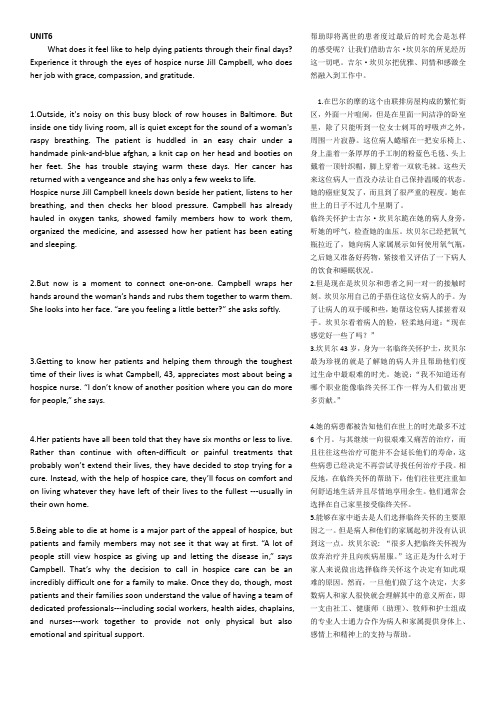
UNIT6What does it feel like to help dying patients through their final days? Experience it through the eyes of hospice nurse Jill Campbell, who does her job with grace, compassion, and gratitude.1.Outside, it's noisy on this busy block of row houses in Baltimore. But inside one tidy living room, all is quiet except for the sound of a woman's raspy breathing. The patient is huddled in an easy chair under a handmade pink-and-blue afghan, a knit cap on her head and booties on her feet. She has trouble staying warm these days. Her cancer has returned with a vengeance and she has only a few weeks to life. Hospice nurse Jill Campbell kneels down beside her patient, listens to her breathing, and then checks her blood pressure. Campbell has already hauled in oxygen tanks, showed family members how to work them, organized the medicine, and assessed how her patient has been eating and sleeping.2.But now is a moment to connect one-on-one. Campbell wraps her hands aro und the woman’s hands and rubs them together to warm them. She looks into her face. “are you feeling a little better?” she asks softly.3.Getting to know her patients and helping them through the toughest time of their lives is what Campbell, 43, appreciates most about being a hospice nurse. “I don’t know of another position where you can do more for people,” she says.4.Her patients have all been told that they have six months or less to live. Rather than continue with often-difficult or painful treatments that probably won’t extend their lives, they have decided to stop trying for a cure. Instead, with the help of hospice care, they’ll focus on comfort and on living whatever they have left of their lives to the fullest ---usually in their own home.5.Being able to die at home is a major part of the appeal of hospice, but patients and family members may not see it that way at first. “A lot of people still view hospice as giving up and letting the disease in,” says Campbell. That’s why the decision to c all in hospice care can be an incredibly difficult one for a family to make. Once they do, though, most patients and their families soon understand the value of having a team of dedicated professionals---including social workers, health aides, chaplains, and nurses---work together to provide not only physical but also emotional and spiritual support. 帮助即将离世的患者度过最后的时光会是怎样的感受呢?让我们借助吉尔·坎贝尔的所见经历这一切吧。
《研究生英语综合教程上》B1 Unit 6
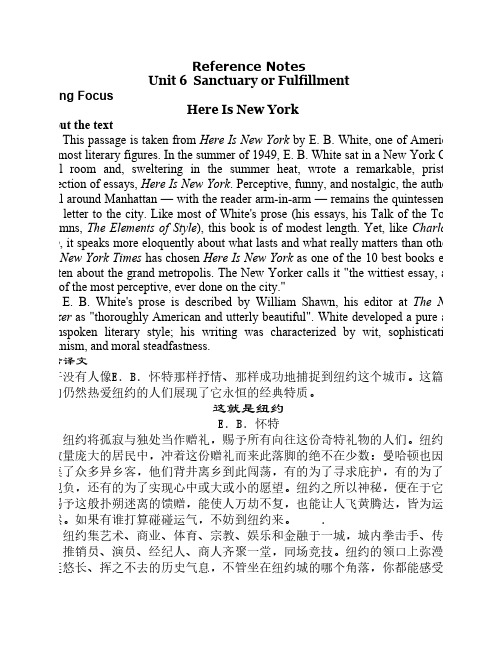
Reference NotesUnit 6 Sanctuary or FulfillmentReading FocusHere Is New YorkAbout the textThis passage is taken from Here Is New York by E. B. White, one of America's foremost literary figures. In the summer of 1949, E. B. White sat in a New York City hotel room and, sweltering in the summer heat, wrote a remarkable, pristine collection of essays, Here Is New York. Perceptive, funny, and nostalgic, the author's stroll around Manhattan — with the reader arm-in-arm — remains the quintessential love letter to the city. Like most of White's prose (his essays, his Talk of the Town columns, The Elements of Style), this book is of modest length. Yet, like Charlotte Web, it speaks more eloquently about what lasts and what really matters than others. The New York Times has chosen Here Is New York as one of the 10 best books ever written about the grand metropolis. The New Yorker calls it "the wittiest essay, and one of the most perceptive, ever done on the city."E. B. White's prose is described by William Shawn, his editor at The New Yorker as "thoroughly American and utterly beautiful". White developed a pure and plainspoken literary style; his writing was characterized by wit, sophistication, optimism, and moral steadfastness.参考译文也许没有人像E.B.怀特那样抒情、那样成功地捕捉到纽约这个城市。
高级英语 课后翻译 unit6
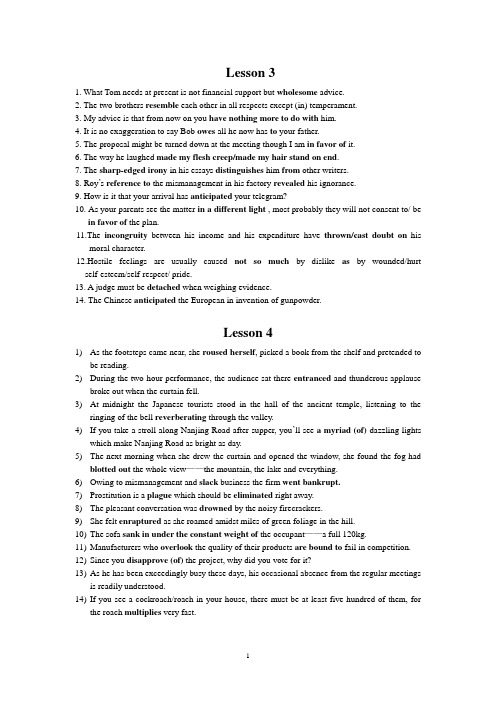
1. What Tom needs at present is not financial support but wholesome advice.2. The two brothers resemble each other in all respects except (in) temperament.3. My advice is that from now on you have nothing more to do with him.4. It is no exaggeration to say Bob owes all he now has to your father.5. The proposal might be turned down at the meeting though I am in favor of it.6. The way he laughed made my flesh creep/made my hair stand on end.7. The sharp-edged irony in his essays distinguishes him from other writers.8. Roy’s reference to the mismanagement in his factory revealed his ignorance.9. How is it that your arrival has anticipated your telegram?10. As your parents see the matter in a different light , most probably they will not consent to/ bein favor of the plan.11.The incongruity between his income and his expenditure have thrown/cast doubt on hismoral character.12.Hostile feelings are usually caused not so much by dislike as by wounded/hurtself-esteem/self-respect/ pride.13. A judge must be detached when weighing evidence.14. The Chinese anticipated the European in invention of gunpowder.Lesson 41)As the footsteps came near, she roused herself, picked a book from the shelf and pretended tobe reading.2)During the two-hour performance, the audience sat there entranced and thunderous applausebroke out when the curtain fell.3)At midnight the Japanese tourists stood in the hall of the ancient temple, listening to theringing of the bell reverberating through the valley.4)If you take a stroll along Nanjing Road after supper, you’ll see a myriad (of) dazzling lightswhich make Nanjing Road as bright as day.5)The next morning when she drew the curtain and opened the window, she found the fog hadblotted out the whole view——the mountain, the lake and everything.6)Owing to mismanagement and slack business the firm went bankrupt.7)Prostitution is a plague which should be eliminated right away.8)The pleasant conversation was drowned by the noisy firecrackers.9)She felt enraptured as she roamed amidst miles of green foliage in the hill.10)The sofa sank in under the constant weight of the occupant——a full 120kg.11)Manufacturers who overlook the quality of their products are bound to fail in competition.12)Since you disapprove (of) the project, why did you vote for it?13)As he has been exceedingly busy these days, his occasional absence from the regular meetingsis readily understood.14)If you see a cockroach/roach in your house, there must be at least five hundred of them, forthe roach multiplies very fast.1)More and more foreign businessmen have come to see that investment in China involves littlerisk.2)May I ask, if you were in my position, how would you deal with this formidable enemy?3)When she got home, Rose was stunned/startled/shocked at what she saw before her.Someone must have slipped in through the broken window. Then it occurred to her to do what was the most sensible thing under the circumstances——to call the police.4)The new inventions are bound to bring great profits to our enterprise.5)The shadow of terrorism looms larger and larger in some Western countries.6)The girl made strict demands on herself and worked very hard.7)You must not forget that sound judgment is supposed to be her forte/merit.8)His brother excels in watercolor rather than in oil painting.9)——Well, much effort has been made to rid the house of roaches but in vain.——You mustn’t/shouldn’t lose hope. Try again and again.10)Fred was not aware that his short hair and new clothes had given him away.11)In recent years some women, though not many, have distinguished themselves in thepolitical arena or/ and the financial world hitherto monopolized by men.12)I hope you will take into account the state of mind he was in under those circumstances andgive him another chance.13)Many students are thrown into a state of confusion and anxiety when they find the valuesgained in college are out of place in society at large.14)The mother said, “My son, listen to me. Quit gambling. If you don’t, it will involve youdeeply in debt and you’ll be ruined.15)I will introduce you to her but I warn you beforehand that she moves in very exclusive socialcircles.16)The book deals with the life and experiences of a self-made man.17)I was told he had been taken in. To put it bluntly, this man is a big fool.18)College students are much more concerned with job opportunities after their graduationnowadays than a few years ago.TEM8英汉短文翻译(2005年3月)既然书籍分门别类,有小说、传记、诗歌等,我们也应区别对待,从中汲取它们各自所能提供的——此话说起来再容易不过了。
研究生英语高级教程1-6单元课文翻译
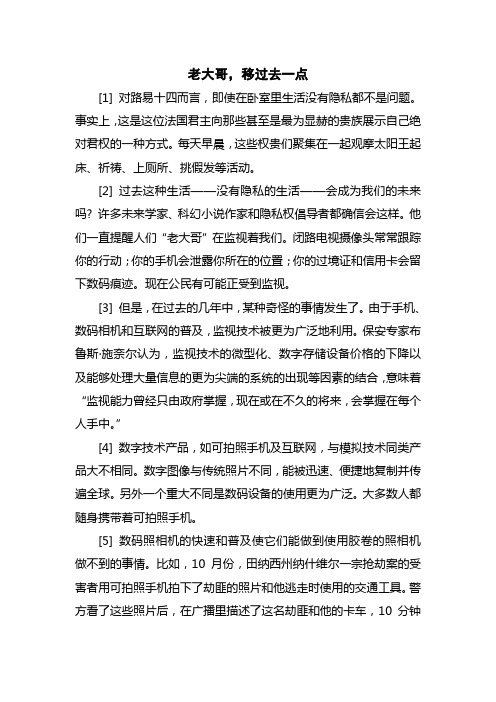
老大哥,移过去一点[1] 对路易十四而言,即使在卧室里生活没有隐私都不是问题。
事实上,这是这位法国君主向那些甚至是最为显赫的贵族展示自己绝对君权的一种方式。
每天早晨,这些权贵们聚集在一起观摩太阳王起床、祈祷、上厕所、挑假发等活动。
[2] 过去这种生活——没有隐私的生活——会成为我们的未来吗? 许多未来学家、科幻小说作家和隐私权倡导者都确信会这样。
他们一直提醒人们“老大哥”在监视着我们。
闭路电视摄像头常常跟踪你的行动;你的手机会泄露你所在的位置;你的过境证和信用卡会留下数码痕迹。
现在公民有可能正受到监视。
[3] 但是,在过去的几年中,某种奇怪的事情发生了。
由于手机、数码相机和互联网的普及,监视技术被更为广泛地利用。
保安专家布鲁斯·施奈尔认为,监视技术的微型化、数字存储设备价格的下降以及能够处理大量信息的更为尖端的系统的出现等因素的结合,意味着“监视能力曾经只由政府掌握,现在或在不久的将来,会掌握在每个人手中。
”[4] 数字技术产品,如可拍照手机及互联网,与模拟技术同类产品大不相同。
数字图像与传统照片不同,能被迅速、便捷地复制并传遍全球。
另外一个重大不同是数码设备的使用更为广泛。
大多数人都随身携带着可拍照手机。
[5] 数码照相机的快速和普及使它们能做到使用胶卷的照相机做不到的事情。
比如,10月份,田纳西州纳什维尔一宗抢劫案的受害者用可拍照手机拍下了劫匪的照片和他逃走时使用的交通工具。
警方看了这些照片后,在广播里描述了这名劫匪和他的卡车,10分钟后,此人便被抓获。
[6] 然而,监视行为的大众化有利有弊。
可拍照手机导致了窥淫癖现象,从而导致了维护个人形象权的新法规的出台。
9月份,美国国会通过了“防止录像窥淫法”,该法案禁止在未经本人同意的情况下对其裸露身体的各个部位或内衣拍照。
该法案的出台是由于可拍照手机的普及以及在卧室、公共浴室、卫生间和更衣室出现隐蔽摄像头事件的增加。
同样,德国议会也通过了一项议案,禁止未经授权在建筑物内拍照。
研究生英语阅读教程第三版课文Lesson6
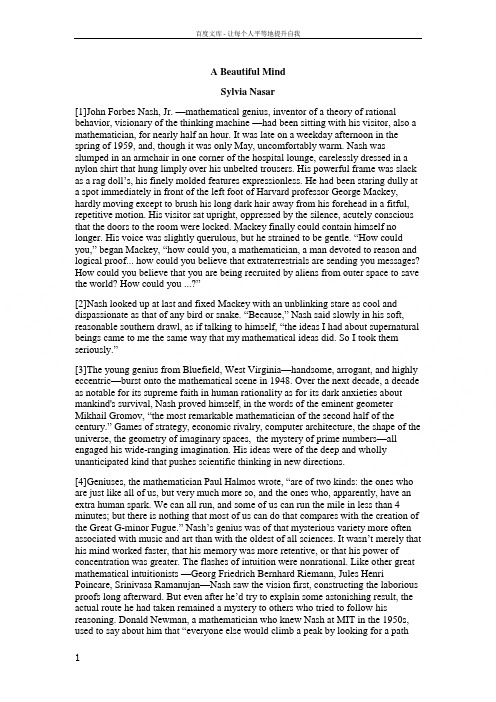
A Beautiful MindSylvia Nasar[1]John Forbes Nash, Jr. —mathematical genius, inventor of a theory of rational behavior, visionary of the thinking machine —had been sitting with his visitor, also a mathematician, for nearly half an hour. It was late on a weekday afternoon in the spring of 1959, and, though it was only May, uncomfortably warm. Nash was slumped in an armchair in one corner of the hospital lounge, carelessly dressed in a nylon shirt that hung limply over his unbelted trousers. His powerful frame was slack as a rag doll’s, his finely molded features expressionless. He had been staring dully at a spot immediately in front of the left foot of Harvard professor George Mackey, hardly moving except to brush his long dark hair away from his forehead in a fitful, repetitive motion. His visitor sat upright, oppressed by the silence, acutely conscious that the doors to the room were locked. Mackey finally could contain himself no longer. His voice was slightly querulous, but he strained to be gentle. “How could you,” began Mackey, “how could you, a mathematician, a man devoted to reason and logical proof... how could you believe that extraterrestrials are sending you messages? How could you believe that you are being recruited by aliens from outer space to save the world? How could you ...?”[2]Nash looked up at last and fixed Mackey with an unblinking stare as cool and dispassionate as that of any bird or snake. “Because,” Nash said slowly in his soft, reasonable southern drawl, as if talking to himself, “the ideas I had about supernatural beings came to me the same way that my mathematical ideas did. So I took them seriously.”[3]The young genius from Bluefield, West Virginia—handsome, arrogant, and highly eccentric—burst onto the mathematical scene in 1948. Over the next decade, a decade as notable for its supreme faith in human rationality as for its dark anxieties about mankind's survival, Nash proved himself, in the words of the eminent geometer Mikhail Gromov, “the most remarkable mathematician of the second half of the century.” Games of strategy, economic rivalry, computer architecture, the shape of the universe, the geometry of imaginary spaces, the mystery of prime numbers—all engaged his wide-ranging imagination. His ideas were of the deep and wholly unanticipated kind that pushes scientific thinking in new directions.[4]Geniuses, the mathematician Paul Halmos wrote, “are of two kinds: the ones who are just like all of us, but very much more so, and the ones who, apparently, have an extra human spark. We can all run, and some of us can run the mile in less than 4 minutes; but there is nothing that most of us can do that compares with the creation of the Great G-minor Fugue.” Nash’s genius was of that mysterious variety more often associated with music and art than with the oldest of all sciences. It wasn’t merely that his mind worked faster, that his memory was more retentive, or that his power of concentration was greater. The flashes of intuition were nonrational. Like other great mathematical intuitionists —Georg Friedrich Bernhard Riemann, Jules Henri Poincare, Srinivasa Ramanujan—Nash saw the vision first, constructing the laborious proofs long afterward. But even after he’d try to explain some astonishing result, the actual route he had taken remained a mystery to others who tried to follow his reasoning. Donald Newman, a mathematician who knew Nash at MIT in the 1950s, used to say about him that “everyone else would climb a peak by looking for a pathsomewhere on the mountain. Nash would climb another mountain altogether and from that distant peak would shine a searchlight back onto the first peak”.[5]No one was more obsessed with originality, more disdainful of authority, or more jealous of his independence. As a young man he was surrounded by the high priests of twentieth-century science—Albert Einstein, John von Neumann, and Norbert Wiener—he joined no school, became no one's disciple, got along largely without guides or followers. In almost everything he did—from game theory to geometry—he thumbed his nose at the received wisdom, current fashions, established methods. He almost always worked alone, in his head, usually walking, often whistling Bach. Nash acquired his knowledge of mathematics not mainly from studying what other mathematicians had discovered, but by rediscovering their truths for himself. Eager to astound, he was always on the lookout for the really big problems. When he focused on some new puzzle, he saw dimensions that people who really knew the subject (he never did) initially dismissed as naive or wrongheaded. Even as a student, his indifference to others' skepticism, doubt, and ridicule was awesome.[6]Nash’s faith in rationality and the power of pure thought was extreme, even for a very young mathematician and even for the new age of computers, space travel, and nuclear weapons. Einstein once chided him for wishing to amend relativity theory without studying physics. His heroes were solitary thinkers and supermen like Newton and Nietzsche. Computers and science fiction were his passions. He considered “thinking machines”, as he called them, superior in some ways to human beings. At one point, he became fascinated by the possibility that drugs could heighten physical and intellectual performancedd9 He was beguiled by the idea of alien races of hyper-rational beings who had taught themselves to disregard all emotion. 10 Compulsively rational, he wished to turn life’s decisions—whether to take the first elevator or wait for the next one, where to bank his money, what job to accept, whether to marry—into calculations of advantage and disadvantage, algorithms or mathematical rules divorced from emotion, convention, and tradition. Even the small act of saying an automatic hello to Nash in a hallway could elicit a furious “Why are you saying hello to me?”[7]His contemporaries, on the whole, found him immensely strange. They described him as “aloof ”, “haughty”, “without affect”, “detached”, “spooky”, “isolated” and “queer”, Nash mingled rather than mixed with his peers. Preoccupied with his own private reality, he seemed not to share their mundane concerns. His manner—slightly cold, a bit superior, somewhat secretive—suggested something “mysterious and unnatural”. His remoteness was punctuated by flights of grrulousness about outer space and geopolitical trends, childish pranks, and unpredictable eruptions of anger. But these outbursts were, more often than not, as enigmatic as his silences. “He is not one of us” was a constant refrain. A mathematician at the Institute for Advanced Study remembers meeting Nash for the first time at a crowded student party at Princeton:I noticed him very definitely among a lot of other people who were there. He was sitting on the floor in a half-circle discussing something. He made me feel uneasy. He gave me a peculiar feeling. I had a feeling of a certain strangeness. He was different in some way. I was not aware of the extent of his talent. I had no idea he would contribute as much as he really did.[8]But he did contribute, in a big way. The marvelous paradox was that the ideas themselves were not obscure. In 1958, Fortune singled Nash out for his achievements in game theory, algebraic geometry, and nonlinear theory, calling him the most brilliant of the younger generation of new ambidextrous mathematicians who worked in both pure and applied mathematics. Nash's insight into the dynamics of human rivalry —his theory of rational conflict and cooperation —was to become one of the most influential ideas of the twentieth century, transforming the young science of economics the way that Mendel’s ideas of genetic transmission, Darwin’s model of natural selection, and Newton’s celestial mechanics reshaped biology and physics in their day.。
(完整word版)研究生英语高级教程第6单元AtWhatCostBeauty
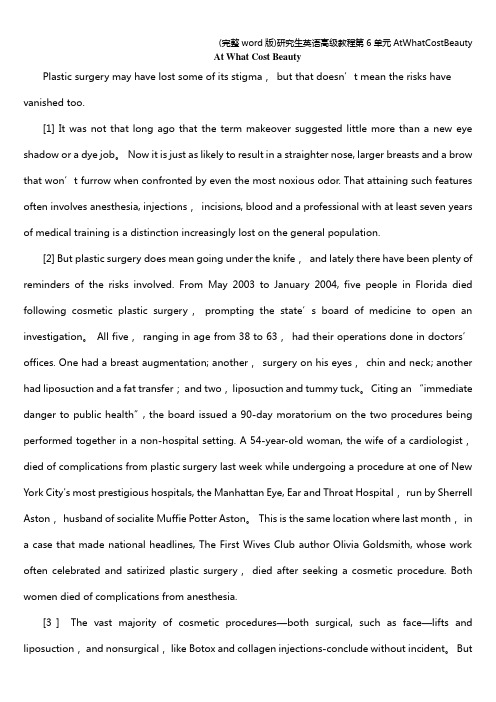
At What Cost BeautyPlastic surgery may have lost some of its stigma,but that doesn’t mean the risks have vanished too.[1] It was not that long ago that the term makeover suggested little more than a new eye shadow or a dye job。
Now it is just as likely to result in a straighter nose, larger breasts and a brow that won’t furrow when confronted by even the most noxious odor. That attaining such features often involves anesthesia, injections,incisions, blood and a professional with at least seven years of medical training is a distinction increasingly lost on the general population.[2] But plastic surgery does mean going under the knife,and lately there have been plenty of reminders of the risks involved. From May 2003 to January 2004, five people in Florida died following cosmetic plastic surgery,prompting the state’s board of medicine to open an investigation。
新编研究生unit 6 -AB
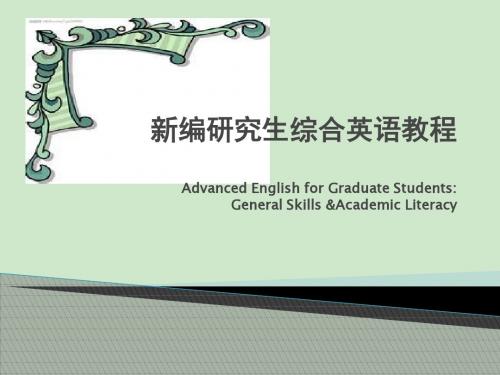
Q2:What is your attitude towards death? And how can
people have a decent death?
Pre-reading Questions
Q3:
What qualities do you think are most
important in a doctor/patient relationship?
home, at a hospice center, in a hospital or in a skilled nursing
facility.
Text A It doesn’t Have to Be Sad:The Life of a Hospice Nurse
Contents
Background
eight years at the paper, Sugg has won local, state and national awards.
Background
2. Information about hospice care
Hospice care is a type of care and philosophy of care focusing on the palliation of a terminally ill or seriously ill patient's pain and symptoms, and attending to their emotional and spiritual needs. The concept of hospice has been evolving since the 11th century. Then, and for centuries thereafter, hospices were places of hospitality for the sick, wounded, or dying, as well as those for travelers and pilgrims. The modern concept of hospice includes palliative care for the incurably ill given in such institutions as hospitals or nursing homes, but also care provided to those who would rather spend their last months and days of life in their own homes. It began to emerge in the 17th century, but many of the foundational principles by which modern hospice services operate were pioneered in the 1950s by Dame Cicely Saunders. Within the United States the term is largely defined by the practices of the Medicare system and other health insurance providers, which make hospice care available, either in an inpatient facility or at the patient's home, to patients with a terminal prognosis who are medically certified to have less than six months to live.
高等学校研究生英语系列教程综合英语上册课文原文+翻译
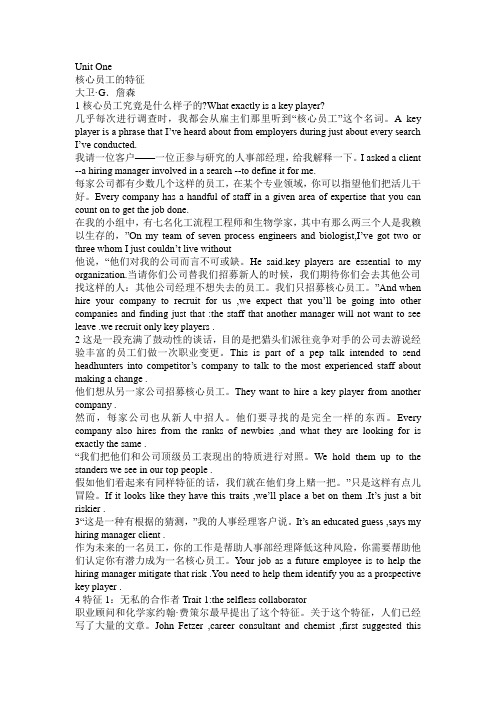
Unit One核心员工的特征大卫·G.詹森1核心员工究竟是什么样子的?What exactly is a key player?几乎每次进行调查时,我都会从雇主们那里听到“核心员工”这个名词。
A key player is a phrase that I’ve heard about from employers during just about every search I’ve conducted.我请一位客户——一位正参与研究的人事部经理,给我解释一下。
I asked a client --a hiring manager involved in a search --to define it for me.每家公司都有少数几个这样的员工,在某个专业领域,你可以指望他们把活儿干好。
Every company has a handful of staff in a given area of expertise that you can count on to get the job done.在我的小组中,有七名化工流程工程师和生物学家,其中有那么两三个人是我赖以生存的,”On my team of seven process engineers and biologist,I’ve got two or three whom I just couldn’t live without他说,“他们对我的公司而言不可或缺。
He said.key players are essential to my organization.当请你们公司替我们招募新人的时候,我们期待你们会去其他公司找这样的人:其他公司经理不想失去的员工。
我们只招募核心员工。
”And when hire your com pany to recruit for us ,we expect that you’ll be going into other companies and finding just that :the staff that another manager will not want to see leave .we recruit only key players .2这是一段充满了鼓动性的谈话,目的是把猎头们派往竞争对手的公司去游说经验丰富的员工们做一次职业变更。
研究生 英语阅读教程 第三版 课文 Lesson 6
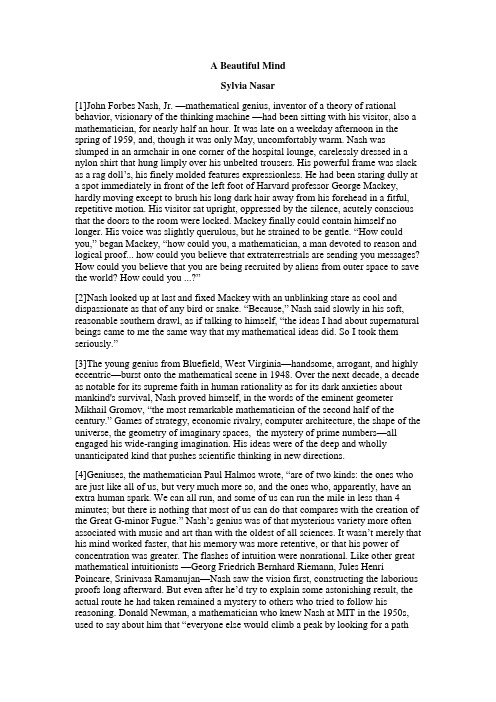
A Beautiful MindSylvia Nasar[1]John Forbes Nash, Jr. —mathematical genius, inventor of a theory of rational behavior, visionary of the thinking machine —had been sitting with his visitor, also a mathematician, for nearly half an hour. It was late on a weekday afternoon in the spring of 1959, and, though it was only May, uncomfortably warm. Nash was slumped in an armchair in one corner of the hospital lounge, carelessly dressed in a nylon shirt that hung limply over his unbelted trousers. His powerful frame was slack as a rag doll’s, his finely molded features expressionless. He had been staring dully at a spot immediately in front of the left foot of Harvard professor George Mackey, hardly moving except to brush his long dark hair away from his forehead in a fitful, repetitive motion. His visitor sat upright, oppressed by the silence, acutely conscious that the doors to the room were locked. Mackey finally could contain himself no longer. His voice was slightly querulous, but he strained to be gentle. “How could you,” began Mackey, “how could you, a mathematician, a man devoted to reason and logical proof... how could you believe that extraterrestrials are sending you messages? How could you believe that you are being recruited by aliens from outer space to save the world? How could you ...?”[2]Nash looked up at last and fixed Mackey with an unblinking stare as cool and dispassionate as that of any bird or snake. “Because,” Nash said slowly in his soft, reasonable southern drawl, as if talking to himself, “the ideas I had about supernatural beings came to me the same way that my mathematical ideas did. So I took them seriously.”[3]The young genius from Bluefield, West Virginia—handsome, arrogant, and highly eccentric—burst onto the mathematical scene in 1948. Over the next decade, a decade as notable for its supreme faith in human rationality as for its dark anxieties about mankind's survival, Nash proved himself, in the words of the eminent geometer Mikhail Gromov, “the most remarkable mathematician of the second half of the century.” Games of strategy, economic rivalry, computer architecture, the shape of the universe, the geometry of imaginary spaces, the mystery of prime numbers—all engaged his wide-ranging imagination. His ideas were of the deep and wholly unanticipated kind that pushes scientific thinking in new directions.[4]Geniuses, the mathematician Paul Halmos wrote, “are of two kinds: the ones who are just like all of us, but very much more so, and the ones who, apparently, have an extra human spark. We can all run, and some of us can run the mile in less than 4 minutes; but there is nothing that most of us can do that compares with the creation of the Great G-minor Fugue.” Nash’s genius was of that mysterious variety more often associated with music and art than with the oldest of all sciences. It wasn’t merely that his mind worked faster, that his memory was more retentive, or that his power of concentration was greater. The flashes of intuition were nonrational. Like other great mathematical intuitionists —Georg Friedrich Bernhard Riemann, Jules Henri Poincare, Srinivasa Ramanujan—Nash saw the vision first, constructing the laborious proofs long afterward. But even after he’d try to explain some astonishing result, the actual route he had taken remained a mystery to others who tried to follow his reasoning. Donald Newman, a mathematician who knew Nash at MIT in the 1950s, used to say about him that “everyone else would climb a peak by looking for a pathsomewhere on the mountain. Nash would climb another mountain altogether and from that distant peak would shine a searchlight back onto the first peak”.[5]No one was more obsessed with originality, more disdainful of authority, or more jealous of his independence. As a young man he was surrounded by the high priests of twentieth-century science—Albert Einstein, John von Neumann, and Norbert Wiener—he joined no school, became no one's disciple, got along largely without guides or followers. In almost everything he did—from game theory to geometry—he thumbed his nose at the received wisdom, current fashions, established methods. He almost always worked alone, in his head, usually walking, often whistling Bach. Nash acquired his knowledge of mathematics not mainly from studying what other mathematicians had discovered, but by rediscovering their truths for himself. Eager to astound, he was always on the lookout for the really big problems. When he focused on some new puzzle, he saw dimensions that people who really knew the subject (he never did) initially dismissed as naive or wrongheaded. Even as a student, his indifference to others' skepticism, doubt, and ridicule was awesome.[6]Nash’s faith in rationality and the power of pure thought was extreme, even for a very young mathematician and even for the new age of computers, space travel, and nuclear weapons. Einstein once chided him for wishing to amend relativity theory without studying physics. His heroes were solitary thinkers and supermen like Newton and Nietzsche. Computers and science fiction were his passions. He considered “thinking machines”, as he called them, superior in some ways to human beings. At one point, he became fascinated by the possibility that drugs could heighten physical and intellectual performancedd9 He was beguiled by the idea of alien races of hyper-rational beings who had taught themselves to disregard all emotion. 10 Compulsively rational, he wished to turn life’s decisions—whether to take the first elevator or wait for the next one, where to bank his money, what job to accept, whether to marry—into calculations of advantage and disadvantage, algorithms or mathematical rules divorced from emotion, convention, and tradition. Even the small act of saying an automatic hello to Nash in a hallway could elicit a furious “Why are you saying hello to me?”[7]His contemporaries, on the whole, found him immensely strange. They described him as “aloof ”, “haughty”, “without affect”, “detached”, “spooky”, “isolated” and “queer”, Nash mingled rather than mixed with his peers. Preoccupied with his own private reality, he seemed not to share their mundane concerns. His manner—slightly cold, a bit superior, somewhat secretive—suggested something “mysterious and unnatural”. His remoteness was punctuated by flights of grrulousness about outer space and geopolitical trends, childish pranks, and unpredictable eruptions of anger. But these outbursts were, more often than not, as enigmatic as his silences. “He is not one of us” was a constant refrain. A mathematician at the Institute for Advanced Study remembers meeting Nash for the first time at a crowded student party at Princeton:I noticed him very definitely among a lot of other people who were there. He was sitting on the floor in a half-circle discussing something. He made me feel uneasy. He gave me a peculiar feeling. I had a feeling of a certain strangeness. He was different in some way. I was not aware of the extent of his talent. I had no idea he would contribute as much as he really did.[8]But he did contribute, in a big way. The marvelous paradox was that the ideas themselves were not obscure. In 1958, Fortune singled Nash out for his achievements in game theory, algebraic geometry, and nonlinear theory, calling him the most brilliant of the younger generation of new ambidextrous mathematicians who worked in both pure and applied mathematics. Nash's insight into the dynamics of human rivalry —his theory of rational conflict and cooperation —was to become one of the most influential ideas of the twentieth century, transforming the young science of economics the way that Mendel’s ideas of genetic transmission, Darwin’s model of natural selection, and Newton’s celestial mechanics reshaped biology and physics in their day.。
研究生英语 Unit6

Before Reading
Global Reading Detailed Reading After Reading
Unit 6 Euthanasia Supplementary Reading
2 Active euthanasia
It involves painlessly putting individuals to death for merciful reasons, as when a doctor administers a lethal dose of medication to a patient.
Байду номын сангаас
Background Information
Seneca
Percy Williams Bridgman
Hippocrates
Immanuel Kant
Before Reading
Global Reading Detailed Reading After Reading
Unit 6 Euthanasia Supplementary Reading
研究生英语课文翻译Unit 6
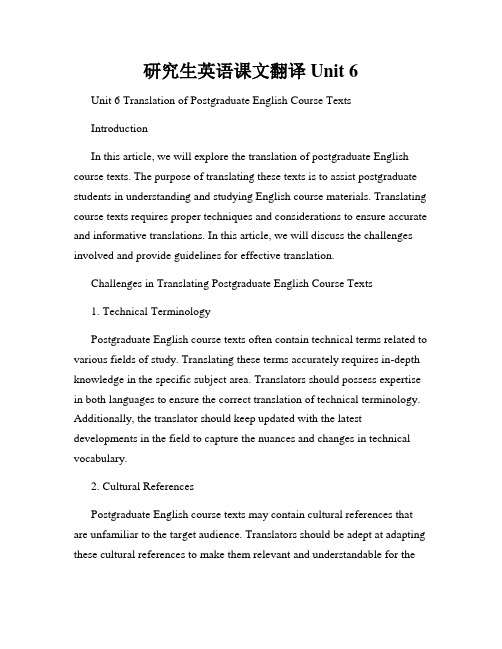
研究生英语课文翻译Unit 6Unit 6 Translation of Postgraduate English Course TextsIntroductionIn this article, we will explore the translation of postgraduate English course texts. The purpose of translating these texts is to assist postgraduate students in understanding and studying English course materials. Translating course texts requires proper techniques and considerations to ensure accurate and informative translations. In this article, we will discuss the challenges involved and provide guidelines for effective translation.Challenges in Translating Postgraduate English Course Texts1. Technical TerminologyPostgraduate English course texts often contain technical terms related to various fields of study. Translating these terms accurately requires in-depth knowledge in the specific subject area. Translators should possess expertise in both languages to ensure the correct translation of technical terminology. Additionally, the translator should keep updated with the latest developments in the field to capture the nuances and changes in technical vocabulary.2. Cultural ReferencesPostgraduate English course texts may contain cultural references that are unfamiliar to the target audience. Translators should be adept at adapting these cultural references to make them relevant and understandable for thereaders. This may involve explaining cultural concepts or finding equivalent references in the target language.3. Sentence Structure and StyleEnglish sentence structure and style may differ significantly from the target language. Translators should ensure that the translated text maintains the appropriate sentence structure, flow, and style while conveying the original meaning accurately. This requires linguistic skills and a deep understanding of both languages.Guidelines for Effective Translation of Postgraduate English Course Texts1. Understanding the ContextBefore starting the translation, it is crucial to thoroughly understand the context of the postgraduate English course text. Familiarize yourself with the subject matter, intended audience, and the purpose of the text. This understanding will enable you to provide an accurate and coherent translation.2. Research and Terminology ConsistencyDue to the technical nature of postgraduate English course texts, extensive research is necessary. Ensure that you have a solid understanding of the technical terminology used in the source text. Create a glossary of key terms and maintain consistency throughout the translation.3. Emphasis on Clarity and AccuracyWhen translating, prioritize clarity and accuracy to ensure effective communication. Use clear and concise language to convey the intended message. Avoid excessive wordiness or ambiguity, as it may confuse the readers.4. Cultural AdaptationAdapt cultural references to make them relatable to the target audience. If necessary, provide explanations or equivalents in the target language. This will enhance the readers' understanding and engagement with the translated text.5. Proofreading and EditingAfter completing the initial translation, thoroughly proofread and edit the text. Check for grammatical errors, typos, and inconsistencies. Make sure that the translated text adheres to the formatting requirements and guidelines provided.ConclusionTranslating postgraduate English course texts requires a comprehensive understanding of the subject matter, technical terminology, and cultural references. By following the guidelines mentioned above, translators can produce accurate, clear, and effective translations that assist postgraduate students in their English language studies.。
高级英语6 Paraphase-期末考试 复习答案
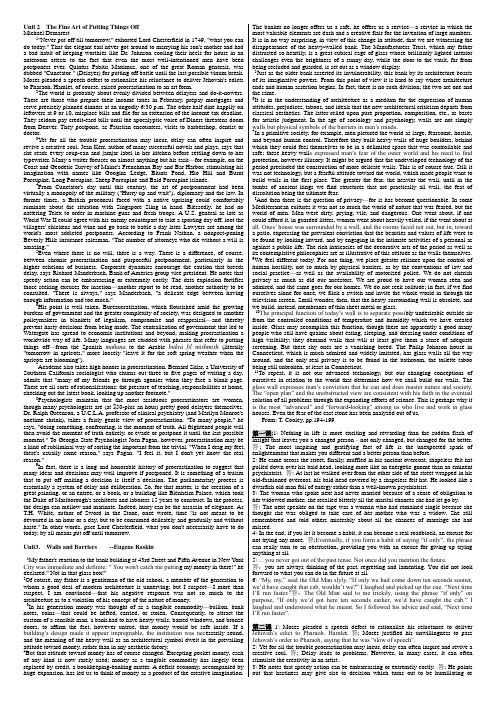
Unit 2 The Fine Art of Putting Things OffMichael Demarest1"Never put off till tomorrow," exhorted Lord Chesterf i eld in 1749, "what you can do today." That the elegant earl never got around to marrying his son's mother and had a bad habit of keeping worthies like Dr. Johnson cooling their heels f or hours in an anteroom attests to the f act that even the most well-intentioned men have been postponers ever. Quintus Fabius Maximus, one of the great Roman generals, was dubbed "Cunctator " (Del ayer) f or putting off battle until the last possible vinum break. Moses pleaded a speech def ect to rationalize his reluctance to deliver Jehovah's edicts to Pharaoh. Hamlet, of course, raised procrastination to an art f orm.2The world is probably about evenly divided between delayers and do-it-nowers. There are those who prepare their income taxes in February, prepay mortgages and serve precisely planned dinners at an ungodly 6:30 p.m. The other half dine happily on lef tovers at 9 or 10, misplace bills and f ile for an ext ension of the income tax deadline. They seldom pay credit-card bills until the apocalyptic voice of Diners threat ens doom from Denver. They postpone, as Faustian encounters, visits to barbershop, dentist or doctor.3Y et f or all the trouble procrastination may incur, delay can of ten inspire and revive a creative soul. Jean Kerr, author of m any successf ul novels and plays, says that she reads every soup-can and jamjar label in her kitchen bef ore settling down to her typewriter. Many a writer f ocus es on almost anything but his task—f or example, on the Coast and Geodetic Survey of Maine's Frenchman Bay and Bar Harbor, stimulating his imagination with names like Googins Ledge, Blunts Pond, Hio Hill and Burnt Porcupine, Long Porcupine, Sheep Porcupine and Bald Porcupine islands.4From Cunctator's day until this century, the art of postponement had been virtually a monopoly of the military ("Hurry up and wait"), diplomacy and the law. In f ormer times, a British proconsul f aced with a native uprising could comf ortably ruminate about the situation with Singapore Sling in hand. Blessedly, he had no nattering Telex to order in machine guns and f resh troops. A U.S. general as late as World War II could agree with his enemy counterpart to take a sporting day off, loot the villagers' chickens and wine and go back to battle a day later. Lawyers are among the world's most addicted postponers. According to Frank Nathan, a nonpost-poning Beverly Hills insurance salesman, "The number of attorneys who die without a will is amazing."5Even where there is no will, there is a way. There is a diff erence, of course, between chronic procrastination and purposef ul postponement, particularly in the higher echelons of business. Corporate dynamics encourage the caution that breeds delay, says Richard Manderbach, Bank of America group vice president. He notes that speedy action can be embarrassing or extremely costly. The data explosion f ortif ies those seeking excuses f or inaction—another report to be read, another authority to be consulted. "There is always," says Manderbach, "a delicate edge between having enough inf orm ation and too much."6His point is well taken. Bureaucratization, which f lourished amid the growing burdens of government and the great er complexity of soci ety, was designed to smother policymakers in blankets of legalism, compromise and reappraisal—and thereby prevent hasty decisions f rom being made. The centralization of government that led to Watergate has spread to economic institutions and beyond, making procrastination a worldwide way of lif e. Many languages are studded with phrases that ref er to putting things of f—from the Spanish mañana to the Arabic bukra fil mishmish(literally "tomorrow in apricots," more loosely "leave it f or the sof t spring weather when the apricots are blooming").7Academe also takes high honors in procrastination. Bernard Sklar, a University of Southern Calif orni a sociologist who churns out three to f ive pages of writing a day, admits that "many of my f riends go through agonies when they f ace a blank page. There are all sorts of rationalizations: the pressure of teaching, responsibilities at home, checking out the latest book, looking up another f ootnote."8Psychologists maintain that the most assiduous procrastinators are women, though many psychologists are (at $50-plus an hour) pretty good delayers themselves. Dr. Ralph Greenson, a U.C.L.A. prof essor of clinical psychiatry (and Marilyn Monroe's onetime shrink), takes a f airly gentle view of procrastination. "To many people," he says, "doing something, confronting, is the moment of truth. All f rightened people will then avoid the moment of truth entirely, or evade or postpone it until the last possible moment." To Georgia State Psychologist Joen Pagan, however, procrastination may be a kind of subliminal way of sorting the important f rom the trivial. "When I drag my f eet, there's usually some reason," says Fagan. "I f eel it, but I don't yet know the real reason."9In f act, there is a long and honorable history of procrastination to suggest that many ideas and decisions may well improve if postponed. It is something of a truism that to put of f making a decision is itself a decision. The parliamentary process is essentially a system of delay and deliberation. So, f or that matter, is the creation of a great painting, or an entree, or a book, or a building like Blenheim Palace, which took the Duke of Marlborough's architects and laborers 15 years to construct. In the process, the design can mellow and marinat e. Indeed, hurry can be the assassin of elegance. As T.H. White, author of Sword in the Stone, once wrote, time "is not meant to be devoured in an hour or a day, but to be consumed delicat ely and gradually and without haste." In other words, pace Lord Chesterf i eld, what you don't necessarily have to do today, by all means put of f until tomorrow.Unit3. Walls and Barriers --Eugene Raskin1My f ather's reaction to the bank building at 43rd Street and Fif th A venue in New Y ork City was immediate and def inite: ― Y ou won't catch me puttin g my money in there!" he declared." Not in that glass box!"2Of course, my f ather is a gentleman of the old school, a member of the generation to whom a good deal of modern architecture is unnerving; but I suspect—I more than suspect, I am convinced—that his negative response was not so much to the architecture as to a violation of his concept of the nature of money.3In his generation money was thought of as a tangible commodity—bullion, bank notes, coins—that could be hef ted, carried, or stolen. Consequently, to attract the custom of a sensible man, a bank had to have heavy walls, barred windows, and bronze doors, to aff irm the f act, however untrue, that money would be saf e inside. If a building’s design made it appear impregnable, the institution was nec essarily sound, and the meaning of the heavy wall as an architectural symbol dwelt in the prevailing attitude toward money, rather than in any aesthetic theory.4But that attitude toward money has of course changed. Excepting pocket money, cash of any kind is now rarely used; money as a tangible commodity has largely been replaced by credit, a bookkeeping-banking matter. A def icit economy, accompanied by huge expansion, has led us to think of money as a product of the creative imagination. The banker no longer offers us a saf e, he offers us a service—a servi ce in which the most valuable elements are dash and a creative f l air f or the invention of large numbers. It is in no way surprising, in view of this change in attitude, that we are witnessing the disappearance of the heavy-walled bank. The Manufacturers Trust, which my f ather distrusted so heartily, is a great cubical cage of glass whose brilliantly lighted interior challenges even the brightness of a sunny day, while the door to the vault, far f rom being secluded and guarded, is set out as a window display.5Just as the older bank asserted its invulnerability, this bank by its architecture boasts of its imaginative powers. From this point of view it is hard to say where architecture ends and human assertion begins. In fact, there is no such division; the two are one and the same.6It is in the understanding of architecture as a medium f or the expression of human attitudes, prejudices, taboos, and ideals that the new architectural criticism departs f rom classical aesthetics. The latter relied upon pure proportion, composition, etc., as bases f or artistic judgment. In the age of sociology and psychology, walls are not simply walls but physical symbols of the barriers in men’s minds.7In a primitive society, for example, men pictured the world as large, fearsome, hostile, and beyond human control. Theref ore they built heavy walls of huge boulders, behind which they could f eel themselves to be in a delimited space that was controllable and saf e; these heavy wall s expressed man’s fear of the outer world and his need to f ind protection, however illusory. It might be argued that the undeveloped technology of the period precluded the construction of more delicate walls. This is of course true. Still it was not technology, but a f earf ul attitude toward the world, which made peopl e want to build walls in the f irst place. The greater the f ear, the heavier the wall, until in the tombs of anci ent kings we f ind structures that are practically all wall, the feat of dissolution being the ultimate f ear.8And then there is the question of privacy—f or is has become questionable. In some Mediterranean cultures it was not so much the world of nature that was f eared, but the world of men. Men were dirty, prying, vile, and dangerous. One went about, if one could afford it, in guarded litters, women went about heavily veiled, if the went about at all. Ones’ house was surrounded by a wall, and the rooms f aced not out, but in, toward a patio, expressing the prevalent conviction that the beauties and values of li f e were to be f ound by looking inward, and by engaging in the intimate activities of a personal as against a public lif e. The rich intricacies of the decorative arts of the period as well as its contemplative philosophies are as illustrative of this attitude as the walls themselves. 9We f eel different today. For one thing, we place greater reliance upon the control of human hostility, not so much by physical barriers, as by the conventions of law and social practice—as well as the availability of motorized police. We do not cherish privacy as much as did our ancestors. We are proud to have our women seen and admired, and the same goes f or our homes. We do not seek solitude; in fact, i f we f ind ourselves alone f or once, we f lick a switch and invite the whole world in through the television screen. Small wonder, then, that the heavy surrounding wall is obsolete, and we build, instead, membranes of thin sheet metal or glass.10The principal f unction of today’s wall is to separate possi bly undesirable outside air from the controlled conditions of temperature and humidity which we have created inside. Glass may accomplish this f unction, though there are apparently a good many people who still have qualms about eating, sleeping, and dressing under conditions of high visibility; they demand walls that will at least give them a sense of adequate screening. But these shy ones are a vanishing breed. The Philip Johnson house in Connecticut, which is much admired and widely imitated, has glass walls all the way around, and the only real privacy is to be f ound in the bathroom, the toilette taboo being still unbroken, at least in Connecticut.11To repeat, it is not our advanced technology, but our changing conceptions of ourselves in relation to the world that determine how we shall build our walls. The glass wall expresses man’s conviction that he can and does master nature and society. The ―open plan‖ and the unobstructed view are consistent with his f aith in the eventual solution of all problems through the expanding eff orts of science. This is perhaps why it is the most ―advanced‖ and ―f orward-looking‖ among us who live and work in glass houses. Even the f ear of the cast stone has been analyzed out of us.From: T. Cooley, pp.194-199Nothing in lif e is more exciting and rewarding than the sudden f lash of– not only changed, but changed f or the better.答; The most inspiring and gratif ying f act of li f e is the unexpected spark of enlightenment that makes you dif ferent and a better person than bef ore.2\ He came across the street, f inally, muf f l ed in his ancient overcoat, shapeless f elt hat pulled down over his bald head, looking more like an energetic gnome than an eminent psychiatrist. 答: At last he walked over from the other side of the street wrapped in his old-fashioned overcoat, his bald head covered by a shapeless f elt hat. He looked like a dwarf ish old man f ull of energy rather than a well-known psychiatrist.3\ The woman who spoke next had never married because of a sense of obligation to her widowed mother; she recalled bitterly all the marital chances she had let go by. 答: The next speaker on the tape was a woman who had remained single because she thought she was obliged to take care of her mother who was a widow. She still remembered and told others miserably about all the chances of marriage she had missed.4\ In the end, if you let it become a habit, it can become a real roadblock, an excuse f or not trying any more. 答;Eventually, if you f orm a habit of saying ―if only‖, the phrase can really turn to an obstruction, providing you with an excuse for giving up trying anything at all.5\ …you never got out of the past tense. Not once did you mention the f uture.答:you are always thinking of the past, regretting and lamenting. You did not look f orward to what you can do in the f uture at all.6\ ―My, my,‖ said the Old Man slyly. ―If only we had come down ten seconds sooner, we’d have caught that cab, wouldn’t we?‖ I laughed and picked up the cue. ―Next time I’ll run f aster.‖答:The Old Man said to me trickily, using the phrase ―if only‖ on purpose, ―If only we’d got here ten seconds earlier, we’d have caught the cab.‖ I laughed and understood what he meant. So I f ollowed his advice and said, ―Next time I’ll run f aster‖.1\ Moses pleaded a speech defect to rationalize his reluctance to deliveredict to Pharaoh. Hamle t. 答; Moses justif ied his unwillingness to pass Jehovah’s order to Pharaoh, saying that he was ―slow of speech‖.2\ Y et f or all the trouble procrastination may incur, delay can of ten inspire and revive a creative soul. 答; Delay leads to problems. However, in many cases, it can of ten stimulate the creativity in an artist。
《研究生英语高级教程》1-6(Key)
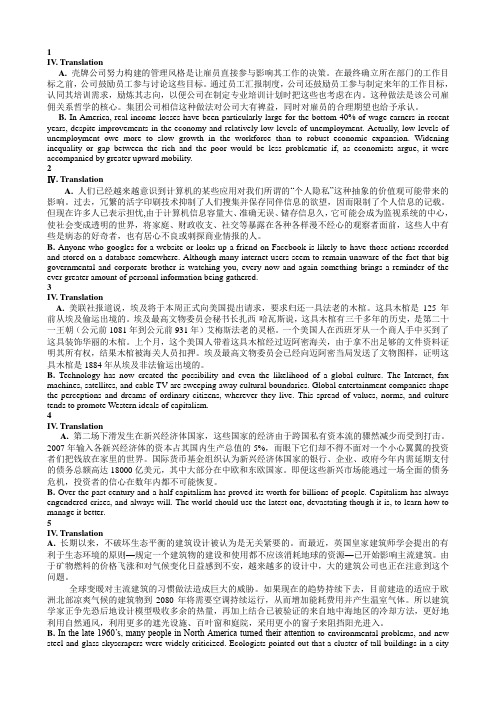
1IV. TranslationA. 壳牌公司努力构建的管理风格是让雇员直接参与影响其工作的决策。
在最终确立所在部门的工作目标之前,公司鼓励员工参与讨论这些目标。
通过员工汇报制度,公司还鼓励员工参与制定来年的工作目标,认同其培训需求,励炼其志向,以便公司在制定专业培训计划时把这些也考虑在内。
这种做法是该公司雇佣关系哲学的核心。
集团公司相信这种做法对公司大有裨益,同时对雇员的合理期望也给予承认。
B. In America, real income losses have been particularly large for the bottom 40% of wage earners in recent years, despite improvements in the economy and relatively low levels of unemployment. Actually, low levels of unemployment owe more to slow growth in the workforce than to robust economic expansion. Widening inequality or gap between the rich and the poor would be less problematic if, as economists argue, it were accompanied by greater upward mobility.2Ⅳ. TranslationA.人们已经越来越意识到计算机的某些应用对我们所谓的“个人隐私”这种抽象的价值观可能带来的影响。
过去,冗繁的活字印刷技术抑制了人们搜集并保存同伴信息的欲望,因而限制了个人信息的记载。
但现在许多人已表示担忧,由于计算机信息容量大、准确无误、储存信息久,它可能会成为监视系统的中心,使社会变成透明的世界,将家庭、财政收支、社交等暴露在各种各样漫不经心的观察者面前,这些人中有些是病态的好奇者,也有居心不良或刺探商业情报的人。
Unit 6 At What Cost Beauty

Unit 6 At What Cost Beauty
PrePre-reading Questions
1. 2.
3.
There are many old sayings about beauty in Chinese and in English. Do you know any of them? English. Nowadays, there are various ways to keep one’s figure and good looks. Have you ever tried any of them? What’s looks. your comment? Have you ever heard of the term “plastic surgery” or heard of anybody who had a plastic surgery? Do their lives change greatly because of the operation? If you had enough money, would you try one? Why or why not?
Plastic surgery
Cosmetic surgery is a very popular approach to personal enhancement. There were 11.9 million enhancement. 11. cosmetic procedures performed in the U.S. alone in 2004. 2004. Although some may hold a negative view of cosmetic surgery, seeing it as frivolous, the soaring number of procedures performed annually shows that cosmetic surgery has become acceptable to the mainstream American household. household.
- 1、下载文档前请自行甄别文档内容的完整性,平台不提供额外的编辑、内容补充、找答案等附加服务。
- 2、"仅部分预览"的文档,不可在线预览部分如存在完整性等问题,可反馈申请退款(可完整预览的文档不适用该条件!)。
- 3、如文档侵犯您的权益,请联系客服反馈,我们会尽快为您处理(人工客服工作时间:9:00-18:30)。
At What Cost BeautyPlastic surgery may have lost some of its stigma, but that doesn’t mean the risks have vanished too.[1] It was not that long ago that the term makeover suggested little more than a new eye shadow or a dye job. Now it is just as likely to result in a straighter nose, larger breasts and a brow that won’t furrow when confronted by even the most noxious odor. That attaining such features often involves anesthesia, injections, incisions, blood and a professional with at least seven years of medical training is a distinction increasingly lost on the general population.[2] But plastic surgery does mean going under the knife, and lately there have been plenty of reminders of the risks involved. From May 2003 to January 2004, five people in Florida died following cosmetic plastic surgery, prompting the state’s board of medicine to open an investigation. All five, ranging in age from 38 to 63, had their operations done in doc tors’ offices. One had a breast augmentation; another, surgery on his eyes, chin and neck; another had liposuction and a fat transfer; and two, liposuction and tummy tuck. Citing an “immediate danger to public health”, the board issued a 90-day moratorium on the two procedures being performed together in a non-hospital setting. A 54-year-old woman, the wife of a cardiologist, died of complications from plastic surgery last week while undergoing a procedure at one of New York City’s most prestigious hospital s, the Manhattan Eye, Ear and Throat Hospital, run by Sherrell Aston, husband of socialite Muffie Potter Aston. This is the same location where last month, in a case that made national headlines, The First Wives Club author Olivia Goldsmith, whose work often celebrated and satirized plastic surgery, died after seeking a cosmetic procedure. Both women died of complications from anesthesia.[3] The vast majority of cosmetic procedures—both surgical, such as face-lifts and liposuction, and nonsurgical, like Botox and collagen injections—conclude without incident. But with the number of these operations growing—8.3 million in 2003, a 293% increase from 1997—things can end badly more often. Part of the problem may be that it is not necessary, from a legal standpoint, to be trained as a plastic surgeon to practice plastic surgery. All a person needs is a medical degree. Doctors can choose to become certified by the American Medical Association-recognized American Board of Plastic Surgery. For that, they must complete seven years of training, including a three year residency in general surgery and at least two additional years of a residency in plastic surgery. But many doctors don’t bother with the special training and practice the surgery anyway to supplement their incomes. Only two of the five doctors in the fatal Florida cases were board-certified. The woman who died after a breast augmentation was operated on by a doctor who specialized in dentistry.[4] Since doctors have the right to perform such operations, it is up to the patient to monitor their backgrounds and decide whether he or she feels comfortable with their training. A patient should also investigate the facility where a procedure would be performed. Technological advances have made it possible to perform intricate surgeries in nonhospital settings on an outpatient basis. Some are done in private, freestanding surgical centers, others in doctors’ offices.[5] Patients often enjoy a doctor’s office because it feels more personal; many doctors prefer it because they exercise complete control over their surroundings and costs. That can be perfectly safe as long as the offices maintain safety precautions, but some states and local governments do not monitor whether they do. The task can be left to accrediting agencies. States may require offices to be accredited, but the agencies perform inspections and give the seal of approval. Theone considered the gold standard is from the American Association for the Accreditation of Ambulatory Surgery Facilities (AAAASF). To receive its blessing, doctors must be board-certified in their field, and their facilities must prove they have the means to handle emergency situations. The problem is that getting inspected for accreditation is done on a voluntary basis. Says Michael McGuire, a Los Angeles cosmetic surgeon and the AAAASF’s president: “Facilities open, and nobody knows on a state level that they are there.”[6] Why—or whether—the liposuction-tummy-tuck combination is particularly hazardous ina doctor’s office is a question the Florida board is investigating. It is not uncommon for people to have multiple procedures performed at once, and when the patient is in good health, it is not especially perilous. But generally, undergoing more than one procedure not only prolongs recovery but also increases the time a patient is anesthetized, which can be risky. “I personally don’t believe in procedures that go beyond five or six hours,” says Dr. Robert Bernard, who operates in his Westchester, N. Y., office and is the president of the American Society for Anesthetic Plastic Surgery, whose members are all board-certified. “If somebody comes in and wants their face, eyes and nose done, that’s O.K. But if they want that as well as breast reduction and a large amount of liposuctio n, I’d prefer to divide it into two procedures.”[7] In one of the Florida cases under investigation, a combination of surgeriesmay have proved fatal. James McCormick had decided to go to the Florida Center for Cosmetic Surgery in Fort Lauderdale to nip and tuck his crow’s feet. His doctor recommended a brow job as well and offered to throw in a chin implant at a discount. McCormick agreed to all the procedures and was at the facility less than four hours. By the next day, he was dead. Citing patient confidentiality, Dr. Jeffrey Hamm, medical director of the facility, declined to discuss the case.[8] Bernard reports that he has received more requests for combination surgeries since the premiere of Extreme Makeover, a phenomenally popular reality show on ABCin which subjects undergo as many as six surgeries at a time to remove any perceived flaws on their bodies. He says the show has generated good p.r. for the field, but he is worried that it raises unrealistic expectations. “People don’t realize that subjects on the show are preselected,” he says. “They’re in excellent health, screened by psychologists and analyzed by the best plastic surgeons in the country to ensure thattheir transformation has the potential to look like a home run.” Bernard points o ut that the subjects also work with dermatologists, cosmetic dentists and hair stylists.[9] Sometimes a patient can appear to do everything right but still end up paying the ultimate price. For her chin tuck, a procedure generally characterized as routine, Goldsmith chose the best board-certified plastic surgeon royalties could buy and had the operation at a respected hospital but still had a bad reaction to anesthesia. Her death was not necessarily related to plastic surgery; it might very well have happened during an emergency appendectomy. It did, however, cause a momentary flutter in the plastic surgery community. Doctors across Florida, California and New York said they received a few concerned calls from patients that week. But virtually no surgeons reported any cancellations. And the phones kept ringing for new appointments.。
